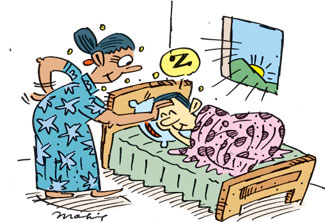|

by R. S. Karunaratne
How to express
'possibility'
or 'permission' The modal verb 'may' is used very often to express
possibility or permission. Being a modal verb it cannot stand alone
without the support of another verb.
To talk about present or future possibilities we can use 'may' with a
bare infinitive.
|

May I use your phone? |
The plane may be late.
She may go or she may not.
It may be raining when you reach Galle.
There may be other problems connected with our trip.
I may meet you tomorrow before you leave for London.
Police may never discover the motive for the killing.
The explosion may have been caused by the terrorists.
He may not like your adverse comments.
There may be some bad eggs in the government service.
'May' is used to ask for, and give permission. This is more formal
than 'can' and 'could'.
May I use your phone?
Of course, you may.
Customers may take a copy of the brochure free of charge.
May I take a little more rice?
Yes, of course.
Hi! my name is Geoffrey. How may I help you?
'May' is used to talk about future doubts and uncertainties.
I may not be able to help you in this matter.
Don't give money to small children: They may waste it.
XYZ party may not win the local elections.
She may not be happy with your gift.
'May' can be used, strangely, to refuse permission.
Visitors may not take photographs inside the museum.
Passengers may not smoke during the flight.
We use 'may' to talk about past possibilities.
Anoma is not in. She may have gone out.
Kamal may not have known about the accident.
|

May I suggest we take a vote
on this proposal? |
You have scored very low marks. You may not have done your homework.
'May' is used with certain adverbs.
Sri Lanka may well win the world cup.
(= there is a strong possibility.)
Sakvithi may very possibly have left the country.
'May' is used in certain set phrases.
We may as well go home: there's no one to issue forms.
May I suggest we take a vote on this proposal? (This is a polite
request)
He may be the boss, but that dosen't mean he can do what he want.
Activity
Complete the sentences with 'may, may not, must, or can't"
1. It ........ be Monday, because yesterday was Sunday.
2. Mary may be in office or she ...... be there.
3. This pen ...... be yours: It has got your name on it.
4. The train ...... be late. Or we ...... be early.
5. Susan didn't call. She ...... have my telephone number.
6. Janaki ...... be married, because she wears a ring.
7. The phone is ringing. It ...... be Fernando from the Ministry.
8. What you see in the sky ...... be a bird or a kite.
9. I am very careful I ...... make such a silly mistake.
10. You ...... go now but come early tomorrow.
***
Key
1. must, 2. may not, 3. must, 4. may, may, 5. may not, 6. must, 7.
may, 8. may, 9. can't, 10. may.
****
What do you call them?
As you know, people live in different countries. Therefore, we
identify them with the names of their countries. Here is a list of
countries. What do you call a man or a woman from each country. Write it
on the dotted line and check your answers with the key.
1. Afghanistan ...............
2. Africa ...............
3. Albania ...............
4. Algeria ...............
5. Angola ...............
6. Argentina ...............
7. Armenia ...............
8. Australia ...............
9. Austria ...............
10. Bahrain ...............
11. The Balkans ...............
12. Bangladesh ...............
13. Barbados ...............
14. Belgium ...............
15. Bermuda ...............
16. Bhutan ...............
17. Bolivia ...............
18. Botswana ...............
19. Brazil ...............
20. Brunei ...............
Key:
*****
1. Afghan, 2. African, 3. Albanian, 4. Algerian, 5. Angolan, 6.
Argentinian, 7. Armenian, 8. Australian, 9. Austrian, 10. Bahraini, 11.
Balkan, 12. Bangladeshi, 13. Barbadian, 14. Belgian, 15. Bermudan, 16.
Bhutanese, 17. Bolivian, 18. Botswanan, 19. Brazilian, 20. Bruneian.
*****
Starters
Commands and
requests
Some sentences in English make commands or requests. What you must
remember is that their subjects are understood. At the end of a command
we use a full stop or a mark of exclamation.
These are some of the
commands:
Wake up!

Read from pages 1-100!
Hurry home!
In these commands the subject 'you' is understood. The exclamation
mark is used to indicate that the sentence is said with strong feeling.
Here are a few requests
Please get into the bus
Brush your teeth
Finish your work
Activity
Write a command or request sentence for each situation below. A model
answer is given in the key although there can be different answers.
1. Tell your sister to open the
window.
2. Tell your classmates to give
you a pen.
3. Tell your younger sister to
leave the room.
4. Tell your dog to bring the
newspaper
5. Tell your friend to play
a game with you.
Key
1. Please open the window.
2. Give me your pen, please.
3. Leave the room.
4. Bring the newspaper!
5. Please come and play hide
and seek with me.
Are the following sentences commands or requests?
1. Comb your hair!
2. Answer the phone!
3. Please drink some water.
4. Will you go to the library
with my sister?
5. Climb down the tree at once!
6. Wait for me!
7. Please let the bird out.
8. Put your shoes on!
9. Please come and help me
to do this sum.
10. Get out!
*******
Key:
1. Command
2. Command
3. Request
4. Request
5. Command
6. Command
7. Request
8. Command
9. Request
10. Command
******* |

